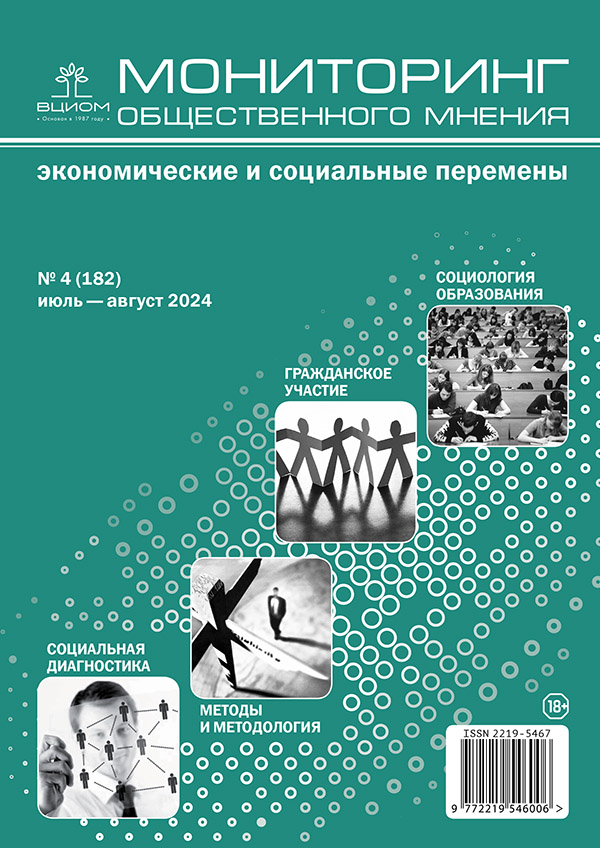Problem of Response Rates in Surveys on the Russian-Ukrainian Conflict
DOI:
https://doi.org/10.14515/monitoring.2024.4.2549Keywords:
Special Military Operation, Russian-Ukrainian conflict, telephone surveys, response rates, cooperation of respondents, sensitive questions, sample biasAbstract
Today, Russian sociologists encounter the issue of the possibility of conducting surveys in military conditions and in the context of certain domestic political events. Experts and sociologists suggest distortions in the survey data obtained in such conditions due to systematic sample biases and insincerity of respondents' answers. The article analyzes changes in the response rates after the start of a military conflict. The research methods include an analysis of paradata of telephone surveys conducted by the Social Research Foundation from February 26, 2022, to July 7, 2023 and an analysis of public telephone surveys conducted by Russian research companies on political topics containing questions about attitudes towards military actions.
The obtained estimates showed that the number of refusals to participate in surveys on the Russian-Ukrainian conflict during military actions increased, and the cooperation of respondents decreased. However, this did not happen immediately after the start of the military confrontation, but only in the period after the end of the active mobilization campaign (since October 2022). On the one hand, questions about military actions cause more interruptions of interviews than other blocks of questions in questionnaires on military and political topics. On the other hand, the share of interrupted interviews did not increase during the military confrontation. The age and gender composition of samples in surveys on the Russian-Ukrainian conflict shifts slightly from young men to women. However, this shift is weakly expressed and cannot significantly affect the results of the studies. In addition, the changes in the sample structure are compensatory in nature: if earlier samples in political surveys steadily shifted towards men, then during the conflict the samples gradually approach the population structure by gender observed in the Rosstat data (the predominance of men remains but becomes slightly less pronounced). A slight reduction in the share of young people in the surveys is not enough to significantly affect their results. Apparently, it is associated with a shar increase in level of emigration, in which mainly young people left Russia.
References
Звоновский В.Б. Выбор метода исследования и реализация выборки // Социологический журнал. 2012. № 1. С. 107-117.
Zvonovsky V.B. (2012) The Choice of the Research Method and the Implementation of the Sample. Sociological Journal. No. 1. P. 107-117. (In Russ.)
Звоновский В.Б. Реализация репрезентативной выборки в массовом опросе // Социологический журнал. 2007. №4. С. 25-47.
Zvonovsky V.B. (2007) Implementation of a Representative Sample in a Mass Survey. Sociological Journal. No. 4. P. 25-47. (In Russ.)
Звоновский В.Б., Григорьева М.В., Соловьева Ю.В. Современные практики проведения телефонных опросов в странах мира // Социологические исследования. 2019. № 1. С. 127-138. https://doi.org/10.31857/S013216250003754-2.
Zvonovsky V.B., Grigorieva M.V., Solovieva Y.V. (2019) Contemporary Practices of Telephone Surveys in the World. Sociological Studies. No. 1. P. 127-138. https://doi.org/10.31857/S013216250003754-2. (In Russ.)
Звоновский В.Б., Ходыкин А.В. Восприятие россиянами конфликта с Украиной: проверка гипотезы «спирали молчания» // Социологические исследования. 2023. № 11. С. 38-50. https://doi.org/10.31857/S013216250028531-7.
Zvonovsky V.B., Khodykin A.V. (2023) Russians' Perception of the Conflict with Ukraine: Testing the “Spiral of Silence” Hypothesis. Sociological Studies. No. 11. P. 38-50. https://doi.org/10.31857/S013216250028531-7. (In Russ.)
Звоновский В.Б., Ходыкин А.В. Отражение культурной власти геополитического нарратива в коллективных представлениях россиян о специальной военной операции // Социологические исследования. 2022. № 11. С. 38-53. https://doi.org/10.31857/S013216250021524-9
Zvonovsky V.B., Khodykin A.V. (2022) Reflection of the Cultural Power of The Geopolitical Narrative in the Collective Perceptions of Russians about the Military Operation in Ukraine. Sociological Studies. No. 11. P. 38-53. https://doi.org/10.31857/S013216250021524-9. (In Russ.)
Звоновский В.Б., Ходыкин А.В. Российское общественное мнение в условиях военного конфликта 2022-2023. Кишинев: Historical Expertise, 2024.
Zvonovsky V.B., Khodykin A.V. (2024) Russian Public Opinion in the Context of the Military Conflict 2022-2023. Chişinău: Historical Expertise. (In Russ.)
Мягков А.Ю. Косвенные методы в сенситивных исследованиях / науч. ред. И.В. Журавлева. М.: ИНФРА-М, 2024.
Myagkov A.Y. (2024) Indirect Methods in Sensitive Researches. Moscow: INFRA-M. (In Russ.)
Рогозин Д.М. Влияние интервьюера на доступность респондентов в телефонном опросе // Социологический журнал. 2004. № 1-2. С. 75-105.
Rogozin D.M. (2004) The Influence of The Interviewer on The Accessibility of Respondents in a Telephone Survey. Sociological Journal. No. 1-2. P. 75-105. (In Russ.)
Рогозин Д.М. Влияние пола респондента на результативность телефонного опроса // Социология 4М. 2006. № 22. С. 77-89.
Rogozin D.M. (2006) The Influence of The Respondent's Gender on The Effectiveness of a Telephone Survey. Sociology 4M. No. 22. P. 77-89. (In Russ.)
Abraham K.G., Maitland A., Bianchi S.M. (2006) Nonresponse in the American Time Use Survey: Who Is Missing from the Data and How Much Does It Matter? International Journal of Public Opinion. Vol. 70. No. 5. P. 676-703.
Brick J.M., Williams D. (2013) Explaining Rising Nonresponse Rates in Cross-sectional Surveys. In: The ANNALS of the American Academy of Political and Social Science. Vol. 645. No. 1. P. 36-59.
Chapkovski Ph., Schaub M. (2022) Do Russians Tell the Truth When They Say They Support the War In Ukraine? Evidence from a List Experiment. LSE European Politics and Policy (EUROPP) Blog (06 Apr 2022). https://eprints.lse.ac.uk/116770/ (accessed: 25.05.2024).
Elder S.R. (1992) Systems for Monitoring Fieldwork Progress and Performance. In: Westlake A., Banks R., Payne C., Orchard T. (eds.) Survey and Statistical Computing. Amsterdam: Elsevier Science Publishers. P. 119-128.
Pechenkina A.O., Bausch A.W., Skinner K.K. (2018) The Pitfalls of List Experiments in Conflict Zones. Civil Wars. Vol. 20. No. 3. P. 408-435.
Reisinger W.M., Zaloznaya M., Woo B.D. (2023) Fear of Punishment as a Driver of Survey Misreporting and Item Non-Response in Russia and Its Neighbors. Post-Soviet Affairs. Vol. 39. No. 1-2. P. 49-59. https://doi.org/10.1080/1060586X.2022.2150490.
Downloads
Published
How to Cite
Issue
Section
License
Copyright (c) 2024 Monitoring of Public Opinion: Economic and Social Changes

This work is licensed under a Creative Commons Attribution-NonCommercial-ShareAlike 4.0 International License.






